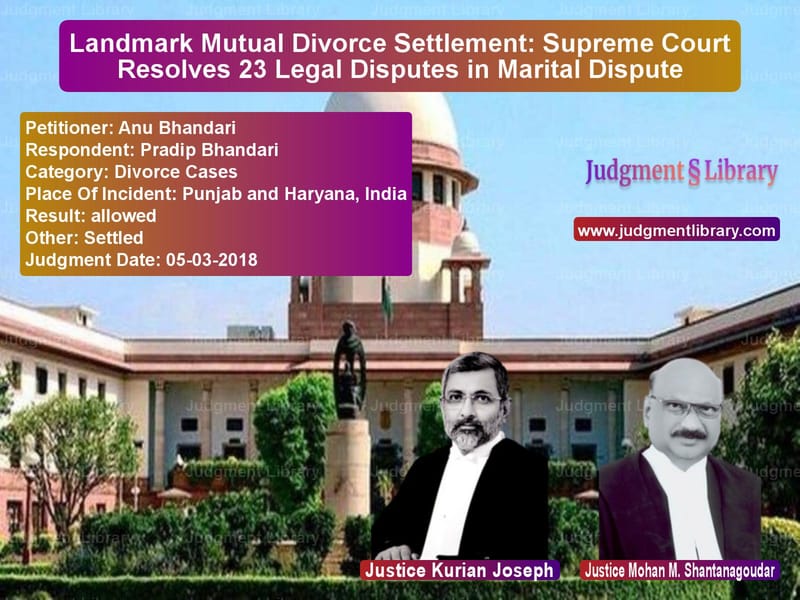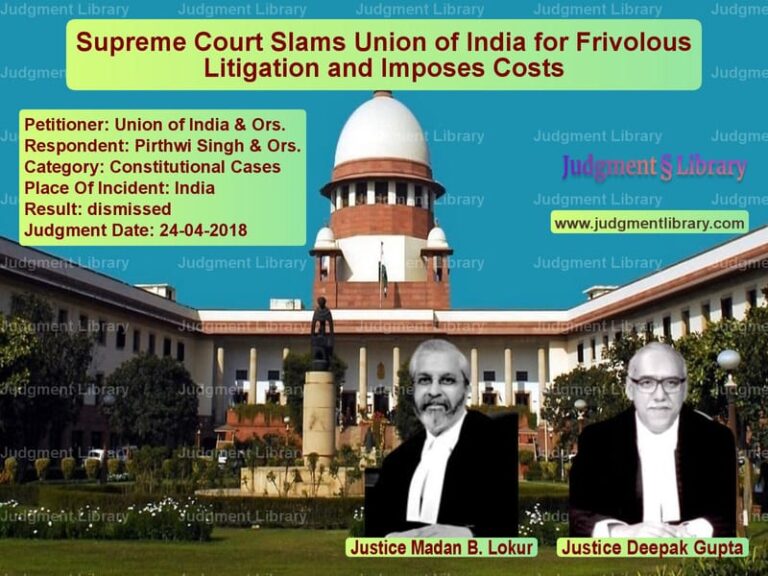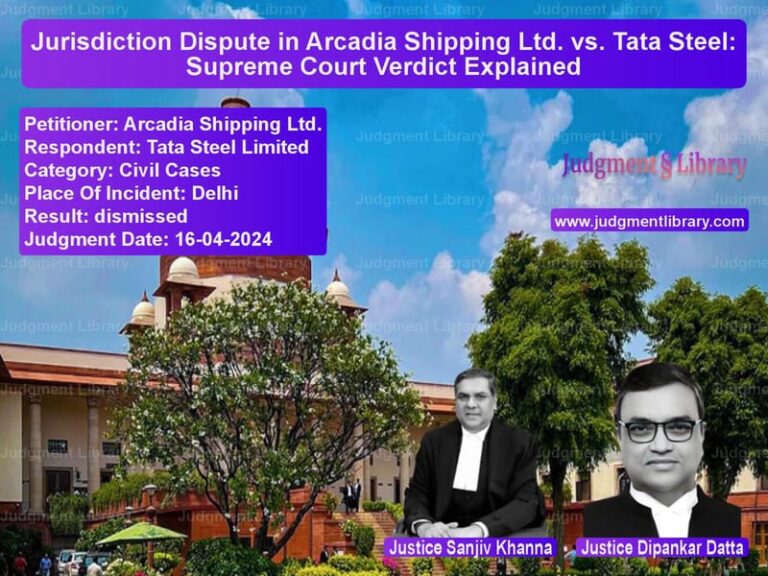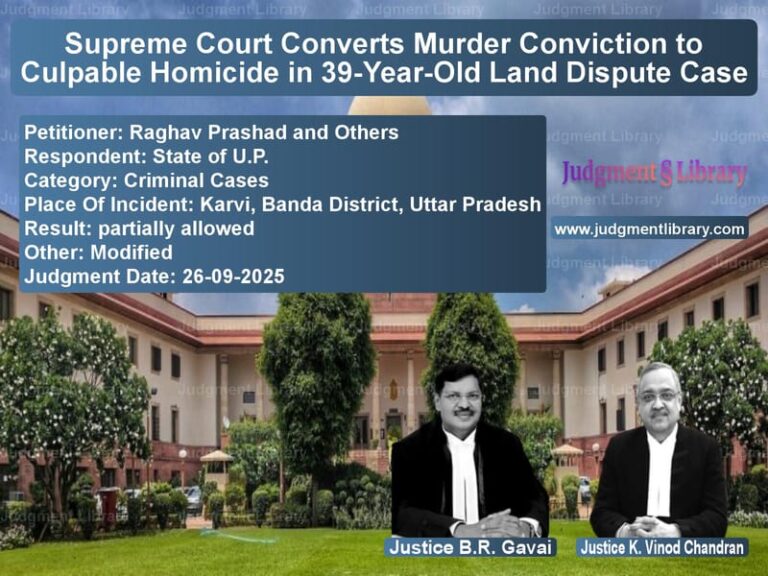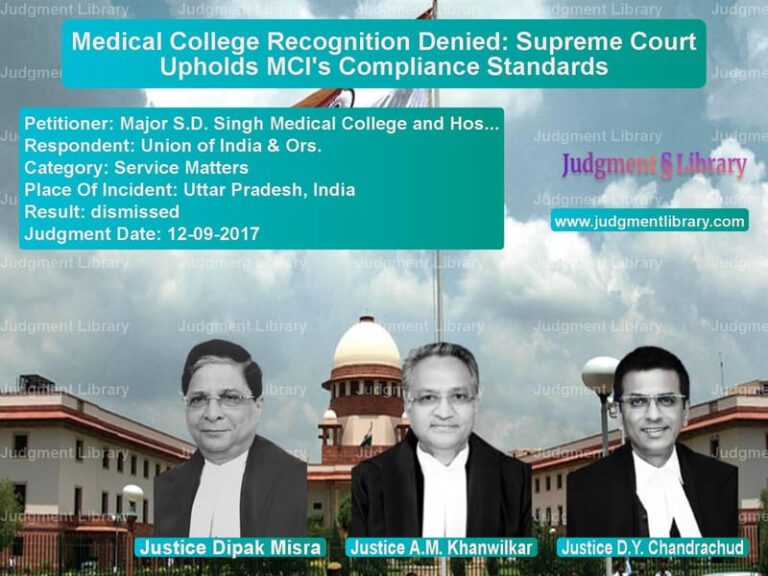Landmark Mutual Divorce Settlement: Supreme Court Resolves 23 Legal Disputes in Marital Dispute
The case of Anu Bhandari vs. Pradip Bhandari is a significant ruling by the Supreme Court of India, demonstrating the importance of judicial intervention in resolving long-standing marital disputes. The Court facilitated an amicable settlement, granting a decree of mutual divorce while also quashing 23 pending civil and criminal cases between the estranged couple. This ruling serves as a model for the resolution of matrimonial disputes through mediation and negotiation.
For nearly seven years, the estranged couple fought multiple legal battles, affecting not only their personal lives but also the well-being of their children. Recognizing the need to provide finality to their disputes, the Supreme Court took proactive steps to ensure an equitable resolution.
Background of the Case
Anu Bhandari and Pradip Bhandari were married on May 18, 1997, following Hindu rites and customs. The marriage resulted in two children, Bhuvi, born on April 19, 1998, and Vibhu, born on January 31, 2008. However, marital discord led to their separation in March 2011. Over the years, their relationship became entangled in extensive litigation, leading to 23 pending cases, including civil, criminal, and consumer matters.
Despite multiple mediation attempts, including interventions by the Punjab and Haryana High Court and an appointed senior mediator, Meenakshi Arora, an amicable resolution remained elusive. The prolonged legal battle caused immense emotional and financial strain on both parties and their children.
Petitioner’s Claims
Anu Bhandari, the petitioner, sought:
- A decree of mutual divorce under the Hindu Marriage Act.
- Closure of all ongoing litigation to bring an end to the distress caused by prolonged disputes.
- Fair financial compensation and a settlement ensuring the welfare of their children.
- Transfer of her husband’s share in jointly owned property to provide financial stability for her and the children.
Respondent’s Claims
Pradip Bhandari, the respondent, contended:
- The marriage had irretrievably broken down, and reconciliation was impossible.
- A mutual divorce was the most pragmatic solution.
- He agreed to transfer his share in an agricultural land located in Panchkula to his wife and children.
- He was willing to comply with financial settlements agreed upon through mediation.
Supreme Court’s Observations
The Supreme Court lauded the efforts of both parties in reaching a settlement and emphasized the role of the judiciary in encouraging mediation. The Court cited Section 9 of the Family Courts Act, 1984, which mandates courts to make genuine efforts to resolve disputes amicably.
The Court remarked:
“Under Section 9 of the Family Courts Act, 1984, the Court has a duty to make an endeavor to assist and persuade the parties in arriving at a settlement.”
The Supreme Court acknowledged that prolonged litigation would not serve any constructive purpose and that mutual consent divorce, along with the quashing of all legal disputes, was the best way forward.
Key Findings of the Supreme Court
- The couple had been living separately for several years, and the continuation of legal disputes would serve no purpose.
- Given the acrimonious nature of the legal battle, mutual divorce was the only viable solution.
- All ongoing litigation should be quashed to allow both parties a fresh start.
- Ensuring financial security for the children was paramount.
Supreme Court’s Directives
The Supreme Court passed a detailed order, directing the following:
1. Mutual Divorce:
The marriage between Anu Bhandari and Pradip Bhandari was officially dissolved by a decree of mutual consent.
2. Quashing of 23 Pending Cases:
The Court quashed all civil, criminal, and consumer cases pending between the parties, including:
- Criminal complaints under Section 498A (cruelty by husband and relatives) filed in Chandigarh.
- Multiple civil suits related to property disputes.
- A consumer case pending before the Chandigarh Consumer Disputes Redressal Forum.
3. Property Settlement:
The Court ordered the immediate transfer of Pradip Bhandari’s share in agricultural land located in Panchkula to Anu Bhandari and their two children. The Tehsildar was directed to process the property transfer without delay.
4. Financial Settlement:
The Court mandated that Pradip Bhandari pay a financial settlement of Rs. 50,000 to his former wife, with a strict timeline for compliance.
5. Prevention of Future Litigation:
The Court ruled that neither party could initiate fresh litigation on matters already resolved in the settlement without seeking prior permission from the Court.
Key Takeaways from the Judgment
- Encouragement of Mediation: The ruling reinforces the importance of mediation and judicial intervention in resolving marital disputes.
- Quashing of Legal Proceedings: The Supreme Court’s decision to quash all pending cases prevented further legal harassment and allowed both parties to move forward.
- Financial and Property Security for Children: By ensuring a structured financial and property settlement, the Court safeguarded the welfare of the couple’s children.
- Expedited Legal Resolution: The Court’s proactive stance in resolving the dispute prevented the continuation of years-long litigation.
Conclusion
This case serves as a landmark example of the judiciary’s role in facilitating amicable settlements in family disputes. By preventing unnecessary litigation and prioritizing mediation, the Supreme Court provided both parties with the opportunity to move forward peacefully.
The judgment underscores the significance of alternative dispute resolution in family matters, ensuring that prolonged court battles do not become an undue burden on individuals and their families. The Court’s firm stance in resolving all outstanding matters in a single ruling provides clarity and a fresh start for the parties involved.
Petitioner Name: Anu BhandariRespondent Name: Pradip BhandariJudgment By: Justice Kurian Joseph, Justice Mohan M. ShantanagoudarPlace Of Incident: Punjab and Haryana, IndiaJudgment Date: 05-03-2018
Don’t miss out on the full details! Download the complete judgment in PDF format below and gain valuable insights instantly!
Download Judgment: Anu Bhandari vs Pradip Bhandari Supreme Court of India Judgment Dated 05-03-2018.pdf
Direct Downlaod Judgment: Direct downlaod this Judgment
See all petitions in Alimony and Maintenance
See all petitions in Child Custody
See all petitions in Property Division in Divorce Cases
See all petitions in Judgment by Kurian Joseph
See all petitions in Judgment by Mohan M. Shantanagoudar
See all petitions in allowed
See all petitions in settled
See all petitions in supreme court of India judgments March 2018
See all petitions in 2018 judgments
See all posts in Divorce Cases Category
See all allowed petitions in Divorce Cases Category
See all Dismissed petitions in Divorce Cases Category
See all partially allowed petitions in Divorce Cases Category

